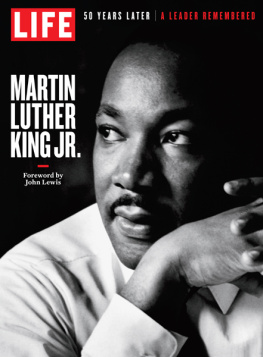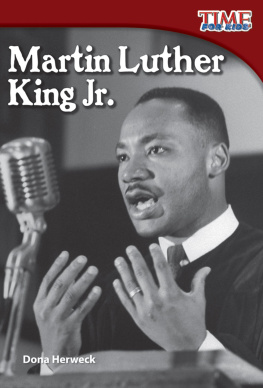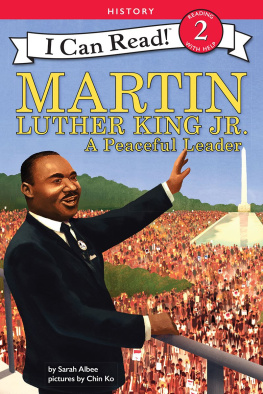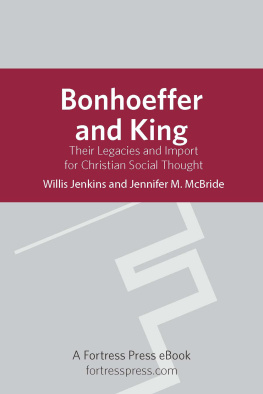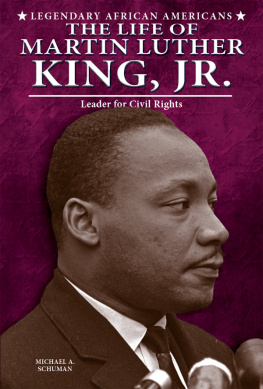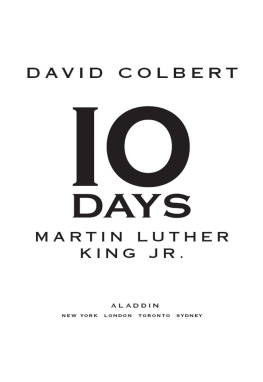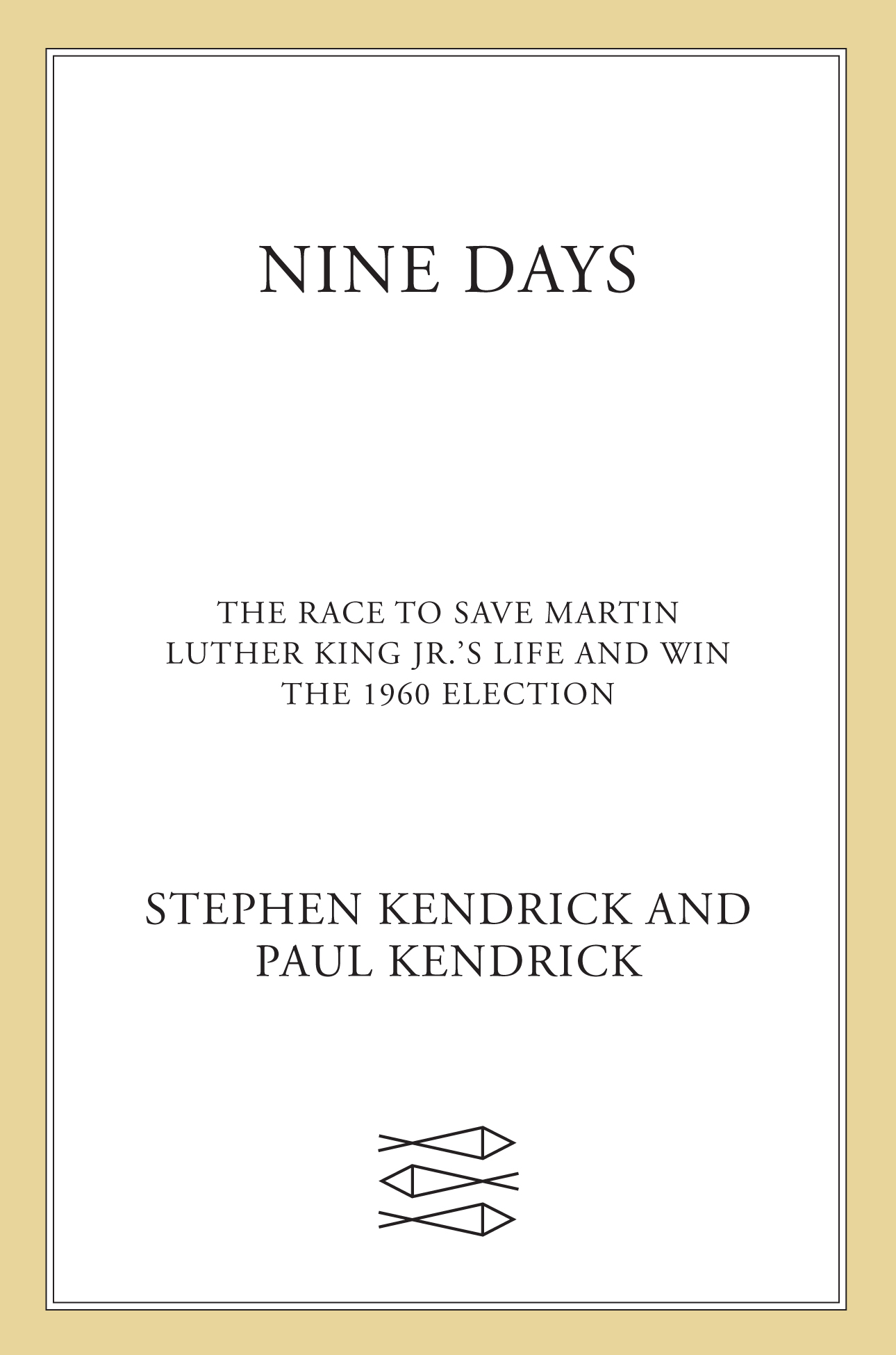The author and publisher have provided this e-book to you for your personal use only. You may not make this e-book publicly available in any way. Copyright infringement is against the law. If you believe the copy of this e-book you are reading infringes on the authors copyright, please notify the publisher at: us.macmillanusa.com/piracy.
Before this thing is over, my son is going to end up bearing the heavy end of this burden.
When Judge Mitchell gave Dr. Kings sentence, it was like being in a room when someone enters and announces a death. Everyone is shocked, frozen, and emotional.
Martin told me late one night that when being driven across those rural Georgia roads in the middle of the night, I knew Id never see anybody again. That kind of mental anguish is worse than dying, riding mile after mile, hungry and thirsty, bound and helpless, waiting and not knowing what youre waiting for, and all over a traffic violation.
And Dr. King can be heard saying, We will transform these jails from dungeons of shame to havens of victory. And that is exactly what happened.
Sunday, October 23, 1960
Coretta Scott King eagerly waited to see her husband. The dining room at Atlantas Paschals Restaurant was packed on this Sunday night; she was surrounded by the boisterous celebrations of students, friends, families, and professors all greeting one another. After five tense days in jail, the freed student sit-in demonstrators were fast arriving, but Coretta was impatient for Martin to walk through the door.
Martin Luther King Jr. had never spent a night in jail until this week, and Paschals, where the food had so often sustained his teams impassioned strategy sessions, felt like the right place for a welcome-home party. The word from Mayor William Hartsfields office was that the last protesters who were still in jail from earlier in the week were now free. This night of their return, there was a sense that last Wednesdays arrests at Richs department store had successfully seized the attention not only of the city but of the entire nation.
With the presidential election sixteen days away, the students had timed the protest to affect a close national contest between John F. Kennedy and Richard Nixon, both of whom had been mostly silent on issues of race. King had not been the instigator of the massive wave of sit-ins centering on Richs, one of the largest department stores in the South, and had at first been reluctant to join the students. But, not wanting to let them down, he had followed their lead, backing the Morehouse College activist Lonnie King. Lonnie wasnt related to the King family, though he had once been a youth leader at Ebenezer Baptist Church under the tutelage of Martin Luther King Sr., known as Daddy King.
Martin and Coretta Scott King had endured much in their first seven years of marriage: the bombing of their first home, where their newborn lay sleeping; a knife attack while King was on tour for his first book; harassment by the police and the tax authorities designed to discourage a growing civil rights movement. When King was arrested with more than fifty students, five days earlier, he decided to refuse bail and face an extended stay in jail. If the Atlanta university students were willing to take this risk to desegregate downtown lunch counters, he could not walk away in the face of their resolve.
The businessman and movement supporter Jesse Hill had called Coretta earlier that Sunday evening to invite her to the gathering at Paschals. Word was spreading through the community that the students had agreed to the mayors proposal of a monthlong truce and that they would be released. The pause would give Mayor Hartsfield time to negotiate a difficult desegregation agreement with Atlantas white business elite. As she dressed for the evening, Coretta was delighted at the prospect of welcoming her husband home. Today, Sunday, was the third birthday of their youngest child, Martin III, and perhaps he could even sneak in a kiss for his sleeping son later that night. Despite having to care for their two children (and being five months pregnant with their third), Coretta had managed to visit her husband in the Fulton County Jail nearly every day. She knew her visits were essential to Kings ability to endure the despondency of prison life, and they had both been heartened at how, despite Kings apprehension, his time in jail had not been as crushing as he had feared. Being surrounded by the students seemed to buoy him up, to steady him. She understood he did not want her to leave the children to be jailed alongside him. Yet when King was behind bars, Coretta once wrote that she felt as though she were imprisoned with him; being on the outside did not help.
Though he was now supposedly a free man, King had yet to appear at Paschals. The servers were bringing out hot plates of food, manna for those who had suffered nothing but jail fare for days. Students shouted with relief when they saw their liberated friends. Yet there was no sign of King, and Coretta started to feel frightened; she had what she called a premonition of evil. Finally, a student came over to confirm what was quickly becoming apparent: They kept Dr. King in jail.
Student leaders ran out of the restaurant, heading back to the Fulton County Jail to figure out what was wrong. All anyone knew was that while the students had been released, King had not.
Unbeknownst to Coretta and everyone else gathered at Paschals that night, the following days would heighten a crisis that would not only help determine the victor of the 1960 election but transform American politics for decades to come. The Reverend Martin Luther King Jr. would end up spending a total of nine days in three different jailsnine days that changed everything. As Sunday evening gave way to midnight on Monday, those around King experienced the sickening realization that another courthouse was summoning him, that unexpectedly he potentially faced a far more dire predicament than before.
Kings family would remember those days in late October 1960 as the time when they most feared for his life.
There wasnt much to pack; you traveled light to and from the Fulton County lockup.
Earlier on that Sunday evening, King had sat silently beside his cellmate Lonnie King, who, as the leader of the students, had presided over a heated discussion about Mayor Hartsfields proposal to get them out of jail. King was content to let the navy veteran and former Morehouse football star lead the way; he trusted Lonnie as a neighbor who shared a newspaper route with his younger brother. The students debated for two hours about whether they should accept Hartsfields offer: the longtime mayor was, after all, one of the only white politicians in the South who actively courted Black voters. Hartsfield, whose eccentric southern charm masked Machiavellian cunning, was asking for the sit-in leaders trust, giving white Atlanta business owners time to see the need to desegregate not only lunch counters but also the entire downtown economic core.


